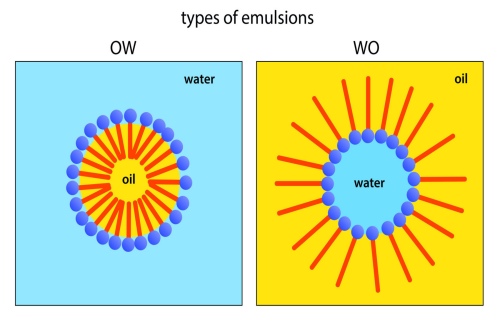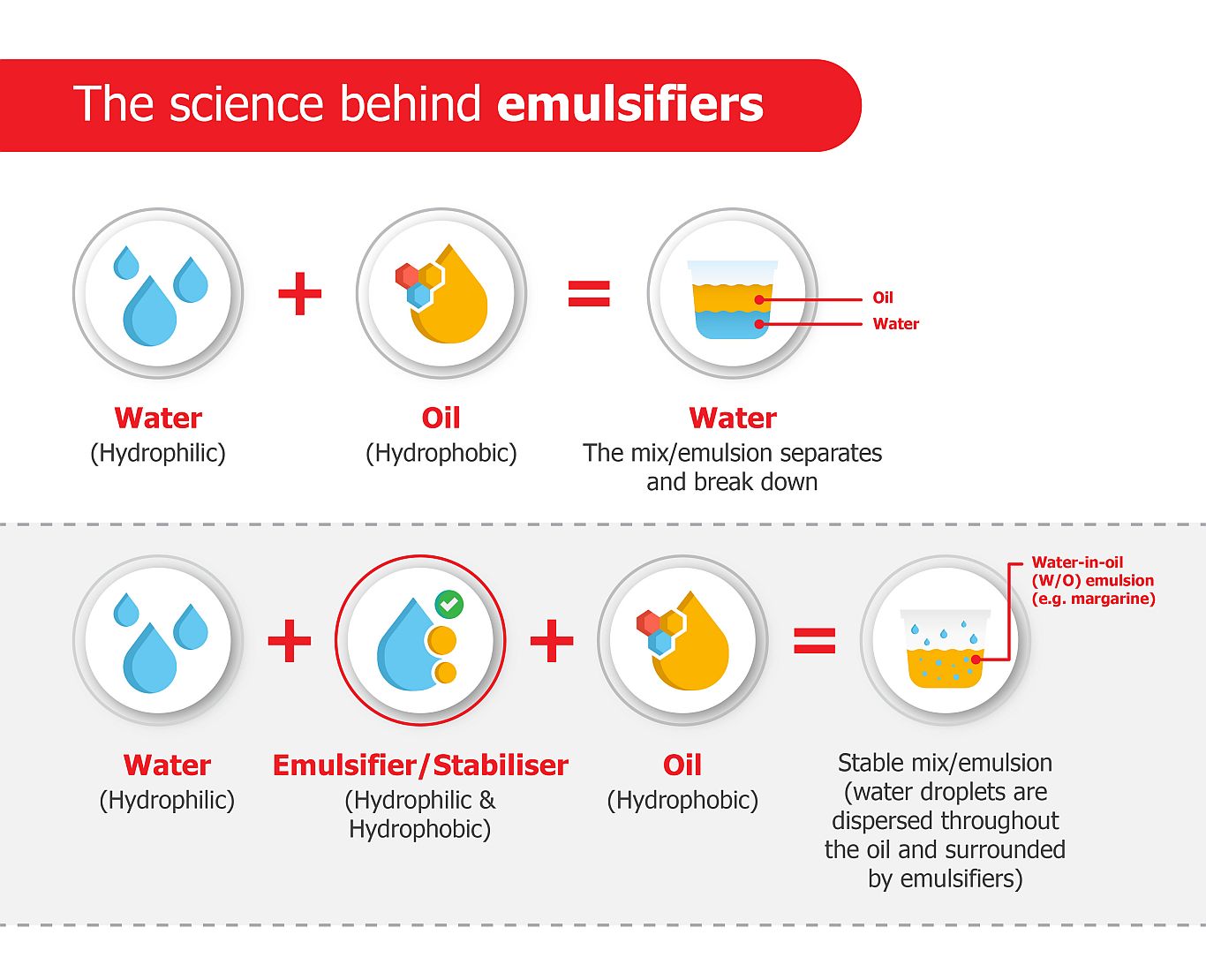The Chemistry Behind Emulsifiers and How They Work
The Chemistry Behind Emulsifiers and How They Work
Blog Article
The Scientific research Behind Emulsifiers and Their Importance in Modern Production
Emulsifiers play a vital function in modern manufacturing, acting as the unsung heroes that mix oil and water for a vast range of items. As consumer preferences shift in the direction of cleaner labels, the need for cutting-edge emulsifiers is growing.
What Are Emulsifiers?
Emulsifiers are crucial representatives in the world of food and item manufacturing, acting as the glue that binds two or else immiscible fluids, like oil and water. Usual instances include lecithin found in egg yolks and soybeans, and mono- and diglycerides used in numerous refined foods.

When you whip up a salad dressing or delight in a luscious treat, emulsifiers help preserve that best appearance. Without emulsifiers, several foods would certainly divide, leading to unfavorable textures and flavors.
The Chemistry of Emulsification
When you mix oil and water, you may notice they do not blend easily; that's where the chemistry of emulsification comes right into play. To overcome this difficulty, emulsifiers are utilized.
These molecules have a hydrophilic (water-attracting) head and a hydrophobic (water-repelling) tail. When you include an emulsifier, its molecules place themselves at the oil-water user interface, lowering surface area stress and permitting the droplets to blend. The emulsifier develops a safety layer around each bead, stopping them from coalescing back right into different layers. Comprehending this chemistry is crucial for achieving stability in products like dressings, creams, and sauces, making emulsification necessary in contemporary production.
Sorts Of Emulsifiers
Numerous kinds of emulsifiers play crucial roles in supporting combinations of oil and water. You'll frequently come across 2 primary classifications: natural and artificial emulsifiers. All-natural emulsifiers, like lecithin from egg yolks or soy, are originated from plants and pets, making them prominent in food. They're typically considered more secure and healthier options.
On the other hand, artificial emulsifiers, such as mono- and diglycerides, are chemically engineered to boost security and life span. They're typically made use of in refined foods and cosmetic items.
Additionally, you might stumble upon non-ionic, anionic, and cationic emulsifiers, each with special properties that affect their performance. Non-ionic emulsifiers, as an example, job well in a variety of pH degrees, while anionic emulsifiers tend to carry out much better in alkaline conditions. Recognizing these types can aid you choose the appropriate emulsifier for your certain application.
Mechanisms of Solution Development
Recognizing just how solutions form is vital for producing steady blends of oil and water. Solutions happen when you spread small droplets of one fluid into one more immiscible fluid, such as oil in water. This process needs energy, frequently provided through frustration or blending. When you introduce an emulsifier, it decreases the surface area stress in between both fluids, allowing them to mix even more easily.
The emulsifier molecules have a hydrophilic (water-attracting) head and a hydrophobic (oil-attracting) tail. When you add an emulsifier, these particles organize themselves at the oil-water interface.
Applications of Emulsifiers in Numerous Industries
Emulsifiers play an important role across numerous markets, making your favored foods smoother and much more delightful. In cosmetics, they boost product appearance and security, guaranteeing an enjoyable application experience. Plus, in drugs, they assist provide essential components effectively, boosting general efficacy.
Food Market Makes Use Of
While you might not recognize it, emulsifiers play a crucial duty in the food industry, boosting the appearance, stability, and life span of several products (Emulsifiers). They're commonly found in salad dressings, sauces, and mayo, assisting to mix oil and water for a smooth, constant item. In baked items, emulsifiers boost dough handling and maintain dampness, leading to a better structure and extended quality. They're additionally important in milk items, where they maintain solutions in creams and ice lotions, avoiding splitting up. Also in snacks, emulsifiers assist keep crunchiness and stop stale flavors. By ensuring uniformity and top quality, emulsifiers are considerable to delivering the tasty products you take pleasure in on a daily basis, making them a crucial active ingredient in modern food manufacturing.
Cosmetic Solutions Advantages
When it pertains to aesthetic formulations, emulsifiers are important for creating products that really feel luxurious and carry out effectively. They assist mix oil and water, making sure a smooth and secure consistency in lotions, lotions, and products. You'll notice that emulsifiers improve product security, protecting against separation and extending service life. This means you can enjoy your favored moisturizer without stressing over it spoiling too quickly. Additionally, emulsifiers improve the application experience, permitting even distribution and better absorption into the skin. By utilizing emulsifiers, you likewise achieve an even more enticing structure, making your cosmetics really feel fascinating on your skin. On the whole, emulsifiers play a vital duty in delivering top notch cosmetic products that meet your beauty requirements.
Pharmaceutical Applications Introduction
In the pharmaceutical industry, emulsifiers are vital for creating reliable medicines. They help develop secure blends of oil and water, making certain that active ingredients are equally distributed and quickly absorbed by the body. You'll discover emulsifiers in numerous dose forms, like creams, lotions, and fluid suspensions, boosting the bioavailability of medicines. They additionally boost the texture and stability of items, making them extra enticing and less complicated to utilize.
The Impact of Emulsifiers on Product Quality

By guaranteeing steady emulsions, you lower the danger of putridity and expand rack life, inevitably saving you time and money. You'll also find that emulsifiers can enhance the bioavailability visite site of energetic components in your products, making them a lot more effective for consumers.
In addition, they enable you to create innovative formulas that meet diverse consumer demands. Whether you're crafting a creamy dressing or a luxurious cream, emulsifiers are vital for attaining the desired results. Simply put, by recognizing and leveraging the effect of emulsifiers, you can considerably elevate the high quality of your products.
Future Fads in Emulsifier Growth
As the demand for cleaner tags and lasting products climbs, the growth of brand-new emulsifiers is set to evolve significantly. You'll see a shift towards plant-based and all-natural emulsifiers, driven by customer preferences for ingredients that are eco friendly and less processed. Advancements in biotechnology will likely improve the performance and effectiveness of these emulsifiers, permitting suppliers to develop stable formulas with less ingredients.
You may also see a rise in multifunctional emulsifiers that not just support solutions however likewise boost taste, texture, or dietary worth. This pattern might simplify component checklists while enhancing product efficiency.
Furthermore, with developments in nanotechnology, emulsifiers could be crafted at the molecular level to attain unmatched click here now stability and effectiveness. Emulsifiers. As you explore these fads, you'll discover that the future of emulsifier growth is not practically functionality, however also concerning embracing sustainability and openness in ingredients
Regularly Asked Questions
Are Emulsifiers Safe for Usage in Food Products?
Yes, emulsifiers are generally safe for intake in food. They've been thoroughly researched and accepted by food security authorities, so you can enjoy your favorite foods without bothering with their influence on your wellness.
Can Emulsifiers Be Derived From All-natural Resources?
Yes, you can derive emulsifiers from all-natural sources. Components like lecithin from egg yolks or soybeans and casein from milk are usual. These all-natural emulsifiers aid stabilize mixes without artificial ingredients, making them popular in different items.

How Do Emulsifiers Influence Service Life of Products?
Emulsifiers stabilize combinations, protecting against separation and putridity - Emulsifiers. By maintaining harmony, they expand products' shelf life, other ensuring freshness and quality. You'll observe that emulsifiers aid keep your favorite foods and cosmetics carrying out well over time
What Are Potential Side Effects of Emulsifiers?
You may experience digestive concerns when consuming items with emulsifiers, as they can interrupt intestine microorganisms. Some researches recommend possible web links to swelling or allergic reactions, however a lot more research study is needed to completely understand these impacts.

Are There Alternatives to Traditional Emulsifiers?
Yes, there are options to typical emulsifiers. You can check out choices like all-natural gum tissues, starches, or lecithin. Each alternative deals distinct homes, so experiment to discover what works best for your details application.
Report this page